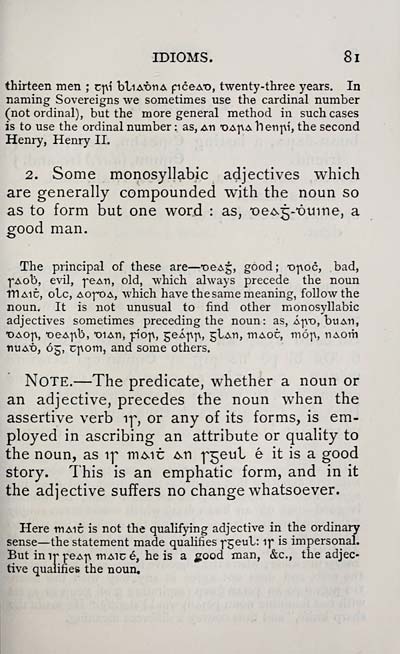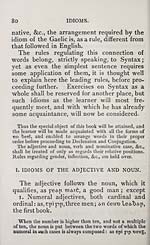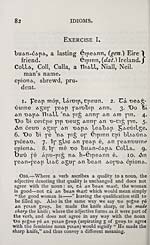Download files
Complete book:
Individual page:
Thumbnail gallery: Grid view | List view

IDIOMS. 8 1
thirteen men ; q\i b"LiAt)nA pceA'O, twenty-three years. In
naming Sovereigns we sometimes use the cardinal number
(not ordinal), but the more general method in such cases
is to use the ordinal number : as, Ati -oa^a henpí, the second
Henry, Henry II.
2. Some monosyllabic adjectives which
are generally compounded with the noun so
as to form but one word : as, 'oe&g-'óuine, a
good man.
The principal of these are — *oeA£, good ; -ojaoc, bad,
fAob, evil, -peAn, old, which always precede the noun
THA1C, olc, AO-poA, which have the same meaning, follow the
noun. It is not unusual to find other monosyllabic
adjectives sometimes preceding the noun: as, Áfvo, buAn,
•OAon, 'oeA^b, •oiati, p'on, 5eÁ|\j\, gbAti, rtiAOC, móp, nAom
tiUAb, 05, cporn, and some others.
Note. — The predicate, whether a noun or
an adjective, precedes the noun when the
assertive verb if, or any of its forms, is em-
ployed in ascribing an attribute or quality to
the noun, as if iridic Ml f5 eu ^ ® it is a good
story. This is an emphatic form, and in it
the adjective suffers no change whatsoever.
Here triAic is not the qualifying adjective in the ordinary
sense — the statement made qualifies r5 eu ^ : T * s impersonal.
But in ír y eA-p triAic é, he is a good man, &c, the adjec-
tive qualifies the noun.
thirteen men ; q\i b"LiAt)nA pceA'O, twenty-three years. In
naming Sovereigns we sometimes use the cardinal number
(not ordinal), but the more general method in such cases
is to use the ordinal number : as, Ati -oa^a henpí, the second
Henry, Henry II.
2. Some monosyllabic adjectives which
are generally compounded with the noun so
as to form but one word : as, 'oe&g-'óuine, a
good man.
The principal of these are — *oeA£, good ; -ojaoc, bad,
fAob, evil, -peAn, old, which always precede the noun
THA1C, olc, AO-poA, which have the same meaning, follow the
noun. It is not unusual to find other monosyllabic
adjectives sometimes preceding the noun: as, Áfvo, buAn,
•OAon, 'oeA^b, •oiati, p'on, 5eÁ|\j\, gbAti, rtiAOC, móp, nAom
tiUAb, 05, cporn, and some others.
Note. — The predicate, whether a noun or
an adjective, precedes the noun when the
assertive verb if, or any of its forms, is em-
ployed in ascribing an attribute or quality to
the noun, as if iridic Ml f5 eu ^ ® it is a good
story. This is an emphatic form, and in it
the adjective suffers no change whatsoever.
Here triAic is not the qualifying adjective in the ordinary
sense — the statement made qualifies r5 eu ^ : T * s impersonal.
But in ír y eA-p triAic é, he is a good man, &c, the adjec-
tive qualifies the noun.
Set display mode to: Large image | Transcription
Images and transcriptions on this page, including medium image downloads, may be used under the Creative Commons Attribution 4.0 International Licence unless otherwise stated. ![]()
| Early Gaelic Book Collections > Blair Collection > Treas leabhar Gaedhilge > (87) |
|---|
| Permanent URL | https://digital.nls.uk/82322430 |
|---|
| Description | A selection of books from a collection of more than 500 titles, mostly on religious and literary topics. Also includes some material dealing with other Celtic languages and societies. Collection created towards the end of the 19th century by Lady Evelyn Stewart Murray. |
|---|
| Description | Selected items from five 'Special and Named Printed Collections'. Includes books in Gaelic and other Celtic languages, works about the Gaels, their languages, literature, culture and history. |
|---|

